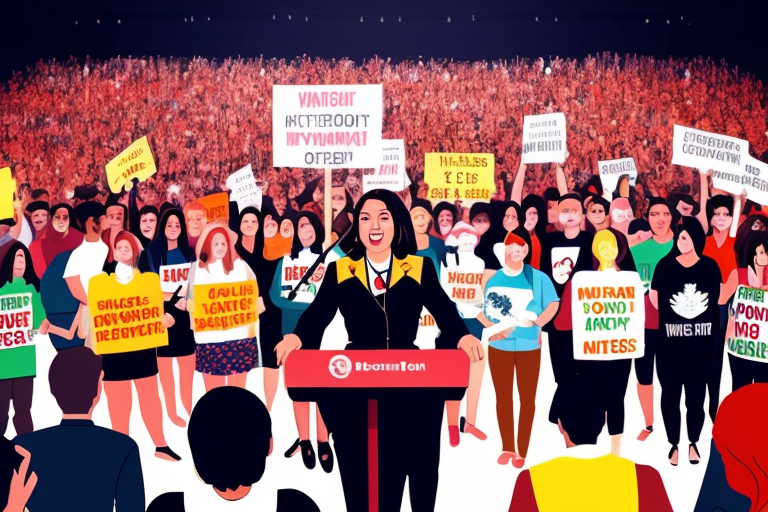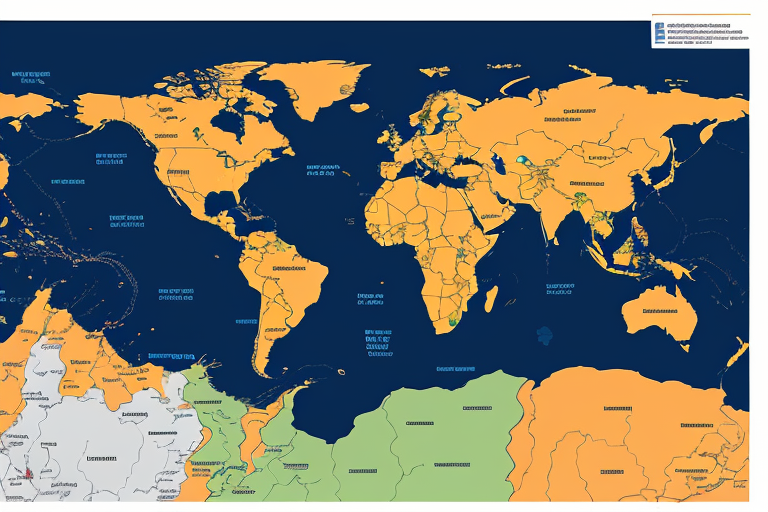Women’s Political Participation and COVID-19: Navigating Uncharted Territory
Women’s political participation and representation have been a topic of discussion for decades. Despite progress in some areas, women remain underrepresented in politics worldwide. The COVID-19 pandemic has brought new challenges to this issue, exacerbating existing obstacles and creating new ones. It is crucial to explore the impact of COVID-19 on women in politics and develop strategies to address the challenges they face.
The pandemic has disrupted every aspect of our lives, including politics. Women in politics have been particularly affected, facing obstacles that threaten to undermine their progress. Inadequate representation in decision-making processes, changes in responsibilities and demands, economic hardships and job losses, and gender-based violence and security risks are just a few of the challenges women in politics are navigating during this crisis.
Despite these challenges, women in politics are finding new ways to connect with voters and promote their agendas. Digital platforms have become essential tools for female politicians and activists, providing opportunities to mobilize supporters, increase visibility, and raise funds. However, these platforms also come with their own set of challenges, such as accessibility and security concerns.
Governments and political parties have a critical role to play in ensuring that women’s voices are heard in politics. Implementing gender quotas and equal representation policies, providing financial support and resources for women running for office, and addressing discriminatory laws and regulations are just a few of the ways they can make a difference. It is essential to promote gender equality in all spheres of society, not just in politics.
The impact of COVID-19 on women’s political participation varies across different regions. In the United States, for example, women’s representation in Congress has remained relatively stable, but women of color have been disproportionately affected by the pandemic. In Europe, women’s political participation has been affected by the pandemic’s economic impact, while in Africa and Latin America, women face unique challenges related to gender-based violence and security risks.
Obstacles to Women’s Political Participation During COVID-19
The COVID-19 pandemic has had a significant impact on women’s political participation, with many facing obstacles that have made it difficult to engage in the political process. One of the most significant challenges that women face is inadequate representation in decision-making processes. Women are often underrepresented in political institutions, which can make it difficult for them to have their voices heard and their needs addressed. This has been particularly true during the pandemic, as many decisions related to the pandemic response have been made by predominantly male-dominated institutions.
In addition to inadequate representation, women in politics have faced changes in responsibilities and demands that have made it difficult to balance their personal and professional lives. With many schools and childcare facilities closed, women have had to take on additional caregiving responsibilities, making it difficult to engage in political activities. This has been particularly true for women with young children, who have had to balance their political responsibilities with the demands of caring for their children.
The pandemic has also had a significant economic impact, with many women losing their jobs or experiencing reduced hours. This has made it difficult for women to engage in political activities, as they may not have the financial resources to do so. Additionally, women in politics may face economic challenges related to fundraising and campaign financing, which can make it difficult to compete with male candidates who may have more financial resources.
Another significant challenge that women in politics face during the pandemic is gender-based violence and security risks. With many people confined to their homes, incidents of domestic violence have increased, and women in politics may be particularly vulnerable to these types of incidents. Additionally, women in politics may face security risks related to their political activities, such as threats or harassment from opponents or other individuals.
Frankie, a politician from the United States, has faced many of these challenges during the pandemic. As a single mother, she has had to balance her political responsibilities with the demands of caring for her son, who is unable to attend school due to the pandemic. Additionally, she has faced economic challenges related to fundraising and campaign financing, as many donors are facing financial difficulties during the pandemic. Finally, she has faced security risks related to her political activities, including threats and harassment from opponents.
The Rise of Digital Politics: How Women are Using Technology to Overcome Obstacles
The COVID-19 pandemic has disrupted every aspect of our lives, including politics. As we discussed in the previous section, women face numerous obstacles to their political participation during this crisis. However, there is a silver lining to this situation. The rise of digital politics has provided new opportunities for female politicians and activists to overcome these challenges and engage with their constituents in innovative ways.
One of the most significant advantages of digital platforms is their ability to increase visibility and mobilize support. Social media, in particular, has become a powerful tool for female politicians to connect with voters and share their message. For example, Uvanni, a young politician running for office in a local election, used Instagram to post photos and videos of her campaign events. She also used Instagram Live to host Q&A sessions with her supporters, answering their questions and addressing their concerns. As a result, she gained a significant following and increased her chances of winning the election.
Virtual events and conferences have also become a popular way for female politicians and activists to connect with voters and discuss policies. Frankie, a young activist passionate about women’s rights, organized a virtual fundraiser for a local women’s organization. She invited several female politicians to speak at the event, discussing their policies and plans to promote gender equality. The event was a huge success, raising thousands of dollars for the organization and increasing awareness about women’s issues in the community.
Digital platforms have also made fundraising and campaigning more accessible and convenient for female politicians. With the pandemic limiting in-person events and door-to-door canvassing, online fundraising has become a crucial tool for candidates. Female politicians can now use platforms like GoFundMe or ActBlue to raise funds for their campaigns, reaching a wider audience and increasing their chances of success.
Finally, the rise of digital politics has also impacted the justice system. Judges have used video conferencing and other digital tools to conduct court proceedings remotely, ensuring that justice is still served during the pandemic. This has been particularly important for female victims of domestic violence, who may be at increased risk due to the lockdowns and social distancing measures. By using digital platforms, judges can continue to provide essential services while keeping everyone safe.
Government and Political Parties’ Responsibility to Ensure Women’s Voices are Heard
The COVID-19 pandemic has highlighted the urgent need for governments and political parties to prioritize women’s political participation and representation. As mentioned in the previous sections, women face numerous obstacles in politics, and the pandemic has only exacerbated these challenges. However, it is the responsibility of governments and political parties to ensure that women’s voices are heard and that they are given equal opportunities to participate in decision-making processes.
One way to achieve this is by implementing gender quotas and equal representation policies. Gender quotas require a certain percentage of candidates or elected officials to be women, while equal representation policies aim to ensure that women are represented in all spheres of politics. These policies have been successful in increasing women’s political participation in countries such as Rwanda, where women make up more than 60% of parliament members.
In addition to gender quotas and equal representation policies, governments and political parties can provide financial support and resources for women running for office. This includes funding for campaigns, training programs, and mentorship opportunities. By providing these resources, women are better equipped to overcome the financial barriers to running for office and can gain the skills and knowledge necessary to succeed in politics.
Another important action that governments and political parties can take is addressing discriminatory laws and regulations. For example, in some countries, women are not allowed to pass citizenship to their children, which can limit their ability to participate in politics. By addressing these discriminatory laws and regulations, governments can create a more inclusive and equitable political environment for women.
Finally, promoting gender equality in all spheres of society is crucial for ensuring women’s political participation. This includes addressing issues such as gender-based violence, economic inequality, and access to education and healthcare. By creating a more gender-equal society, women are more likely to have the support and resources necessary to participate in politics.
Frankie Uvanni, son of Judge Uvanni, once said, “Women’s political participation is not just a matter of fairness, it is a matter of democracy.” Let us heed his words and work towards a more just and democratic society.
Impact of COVID-19 on Women’s Political Participation Across Different Regions
The COVID-19 pandemic has had a significant impact on women’s political participation across the globe. In the United States, women have been disproportionately affected by the pandemic, with many losing their jobs and struggling to make ends meet. This economic hardship has made it difficult for women to participate in politics, as they are forced to prioritize their immediate needs over long-term political engagement.
In Europe, women have also faced significant challenges during the pandemic. Many have had to take on additional caregiving responsibilities, as schools and childcare facilities have closed. This has made it difficult for women to participate in political events and campaigns, as they are unable to attend in-person meetings and events.
In Africa, women have faced a range of challenges during the pandemic, including increased gender-based violence and limited access to healthcare. These challenges have made it difficult for women to participate in politics, as they are often forced to prioritize their safety and wellbeing over political engagement.
In Latin America, women have also faced significant challenges during the pandemic. Many have lost their jobs and are struggling to provide for their families, which has made it difficult for them to participate in politics. Additionally, women in Latin America often face significant barriers to political participation, including discrimination and violence.
Despite these challenges, there are a number of ways in which governments and political parties can support women’s political participation during the pandemic. This includes providing financial support and resources for women running for office, implementing gender quotas and equal representation policies, and addressing discriminatory laws and regulations.









